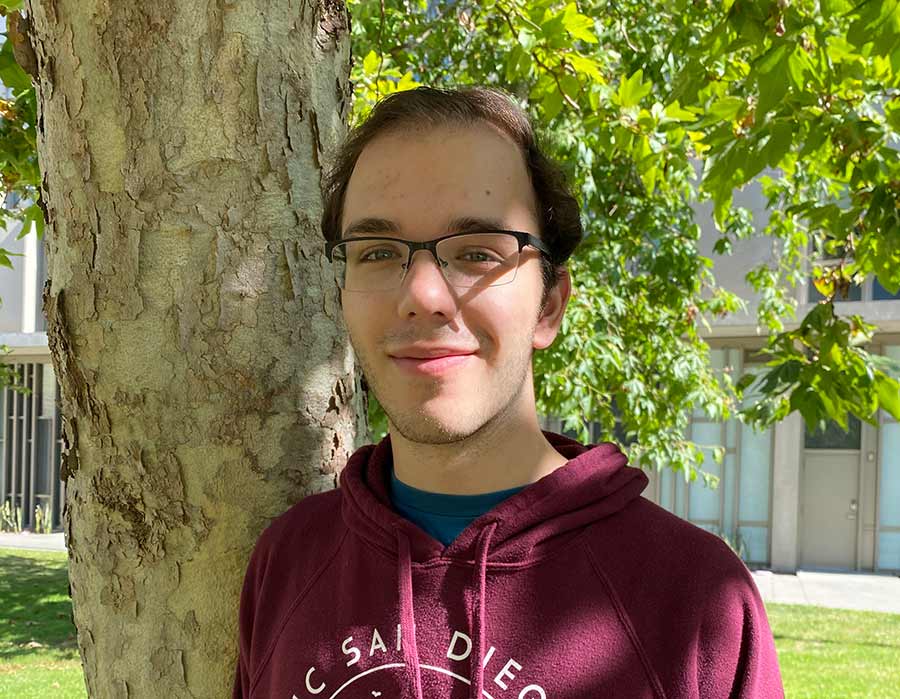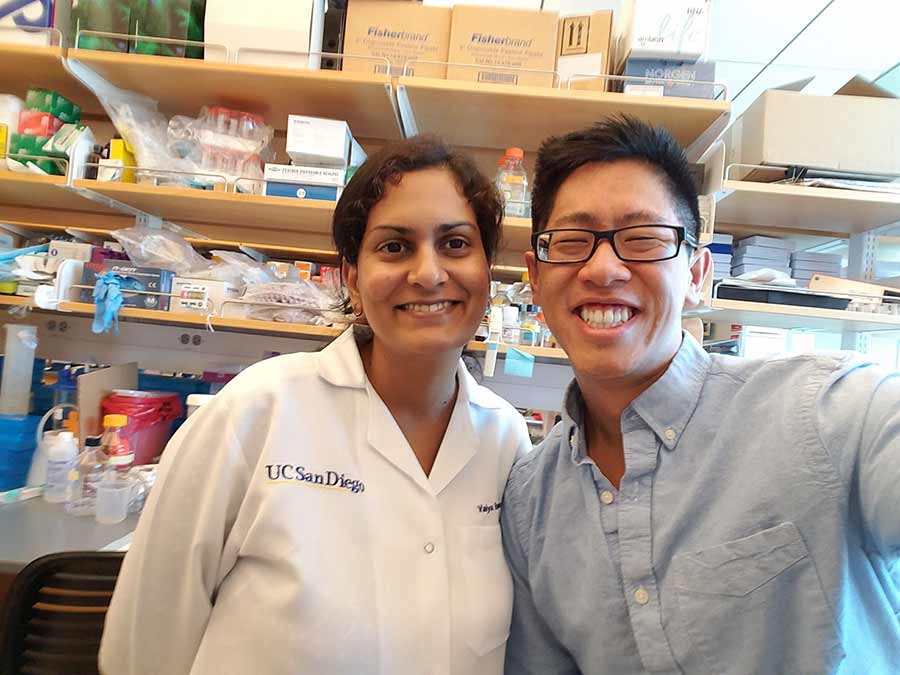By:
- Michelle Franklin
Published Date
By:
- Michelle Franklin
Share This:
For Regents Scholars, Matchmaking is a Research Affair
UC San Diego’s initiative gives freshmen an early start in research
As an incoming freshman, Luke Sztajnkrycer was given an opportunity to do something off limits to most first-year college students: work in the lab of a faculty researcher whose work mirrored his own academic interests.

Luke Sztajnkrycer will start his second year as a Cognitive Science major.
Sztajnkrycer participated in the Regents Scholars Research Initiative (RSRI), a unique program that pairs incoming Regents Scholars freshmen or transfer students with a faculty mentor, allowing them to gain hands-on experience in research during their first quarter on campus.
Regents Scholars do not have to apply to participate in RSRI; instead, they submit a letter of interest that includes a list of researchers whose work aligns with their own academic pursuits. It is then up to the RSRI program coordinator to match scholars with faculty mentors.
Sztajnkrycer is a Cognitive Science major, specializing in machine learning and neurocomputation. He decided to attend UC San Diego because he wants to pursue neuroeconomics in the longer term—an interdisciplinary field focused on prediction and decision-making in humans. There is a significant computational aspect to neuroeconomics, so he was excited to pair with Associate Professor of Cognitive Science Angela Yu because her lab focuses on computation and cognitive neuroscience.
The experience Sztajnkrycer gained in Yu’s lab taught him practical skills like writing code for experiments so that data can be properly aggregated, analyzed and shared; protocols that have to be followed for human subject research; and how important it is to be prepared when presenting papers.
Even with the COVID-19 shutdown, he’s still been able to work on a new project that studies attractiveness while continuing to work in Yu’s lab. “I absolutely loved participating in RSRI,” Sztajnkrycer said. “I was able to start conducting research as a freshman, which has been the most real education I’ve gotten on campus.”
Vice Chancellor for Research Sandra Brown says RSRI is a perfect fit for UC San Diego’s vision. “As a student-centered, research-focused university, the Regent Scholars Research Initiative provides a one-of-a-kind opportunity for students to learn through hands-on experience the moment they get to campus. Through mentorship with faculty and work in the lab, we are growing the researchers of tomorrow.”
A new way to make a connection
Regents Scholarships are awarded to University of California undergraduates or transfer students who show demonstrated academic excellence. Because it is a UC-wide scholarship program, Revelle College Provost Paul Yu wanted to find a way to make UC San Diego stand out. He knew that freshmen gaining actual lab experience at the other UC campuses was almost impossible. When RSRI launched in 2008, he joined with Dean of Undergraduate Research Advancement David Artis and Director of Global Education Courtney Giordano to begin pairing Regents Scholars with faculty mentors based on their declared majors.

Billy Nguyen with postdoctoral scholar Valya Ramakrishnan working together in a lab.
“It was a really extraordinary opportunity to give freshmen a way into a faculty member’s lab,” Yu said. “It’s not something they would be able to navigate on their own. RSRI was a matchmaking service in a way.” The program is managed through the Office of Research Affairs and since those early days, RSRI has paired more than 650 students with research faculty.
Often the arrangement works out so well for both the student and the researcher that the partnership lasts well past one quarter. When Thien “Billy” Nguyen ’16, Neuroscience, Physiology was a part of RSRI, he had the opportunity to work in a lab at the Moores Cancer Center—something very rare for undergraduates. He said, “I knew I wanted to go to medical school, but didn’t know what I wanted to study. Finding a mentor early on was really important.”
Nguyen ended up in Clark Chen’s lab studying glioblastoma, an aggressive and fatal form of brain cancer. Chen was co-director of the Center for Theoretical and Applied Neuro-oncology at the time and Nguyen was able to study the effects of cancer treatment on glioblastoma at the molecular level. He found the work so compelling he stayed in Chen’s lab for four years.
Nguyen, who is now a pediatric resident physician at UCSF, said Chen helped him in more ways than one. “I’m very grateful for the opportunity to participate in the RSRI program,” he states. “Not just for the mentorship, but for the opportunity to develop a new framework of thinking and reasoning. How do you create a sound hypothesis? How do you approach an unexplored molecular pathway? I had the opportunity to apply my textbook knowledge and explore the unknown, which was exceedingly valuable because it showed me how fluid the field of science truly is.”
Developing effective research habits is just one of hidden benefits of the program, says Artis. “Of course the mentorship is very important, but they get so much more out of the program,” he said. They learn how to collaborate as a part of a team. They learn how to act professionally—you can’t just miss deadlines or skip experiments when you are being funded by a grant. They also learn persistence and resiliency—what happens when an experiment doesn’t work out? And they learn good communications skills—they need to be clear and detailed in their methods so the experiment can be replicated.
He went on to say “As a freshman or transfer student, when you are a part of a lab, people are counting on you and you are contributing—that commitment creates a sense of belonging. This is really important in creating a full, rewarding college experience.”
Share This:
You May Also Like
Stay in the Know
Keep up with all the latest from UC San Diego. Subscribe to the newsletter today.



